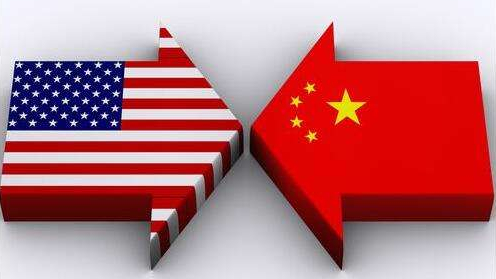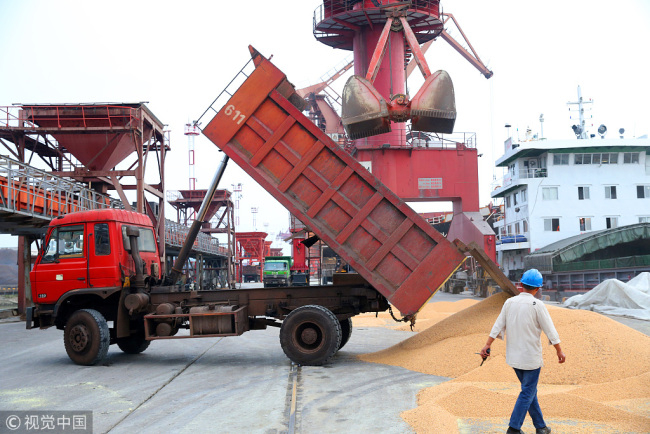
Opinions
12:04, 23-Aug-2018
Opinion: More tariffs mean more pain ahead for American companies
Updated
11:54, 26-Aug-2018

Editor's note: The following is an edited translation of commentary from the Chinese-language "Commentaries on International Affairs."
"It was more than just metal and two wheels; it was a source of freedom, and an entry point to adulthood," said Bob Margevicius, who is on the board of directors of the US Bicycle Product Suppliers Association. In a speech heavy with emotion during a hearing by the Office of the United States Trade Representative, Margevicius said, "For many who can't afford the expense of a car, it is their primary mode of transportation; for others, it is a prescription for a healthy life… I'm testifying to preserve this simple pleasure from becoming collateral damage in a trade dispute."
Margevicius was appealing for calmer heads to prevail when he appeared at one of the six days of hearings that started on Monday on the proposed tariffs on 200 billion US dollars worth of imported Chinese products. For American companies, there are only two ways to avoid the impact of the tariffs: seek an exemption, or persuade the government to abandon its plan to impose tariffs and instead negotiate a solution to its trade disputes.

Workers are unloading Brazil imported soybeans at Jiangsu Nantong port wharf on Aug 21, 2018./VCG Photo
Workers are unloading Brazil imported soybeans at Jiangsu Nantong port wharf on Aug 21, 2018./VCG Photo
The road to an exemption is a hard one. This has been demonstrated by the government's actions following the introduction of the steel tariff. Since May this year, American companies have submitted more than 20,000 applications for tariff exemptions, but the US Department of Commerce is yet to approve any. Why? Because America's two largest steel manufacturers say that the tariffs are stimulating domestic steel production in the United States. It's no surprise that these two companies are fans of the tariff. Choking off imports pushes up the price of steel in the domestic market. This is good news if you make steel, but bad news if your business needs to use it.
After the hearings started in Washington, the Wall Street Journal said "the participants generally requested exemptions from the tariffs... Witnesses underscored the difficulty of trying to find suppliers outside China for their products." Faced with a growing number of requests for exemptions, the already overwhelmed Commerce Department has little in the way of a solution to the problems faced by these American companies.
How much protest or pleading would it take to convince the United States government to change course? At the hearings in late July about a plan to introduce tariffs on 16 billion US dollars' worth of imports from China, 82 people spoke – and only six of them supported the move to impose the tariffs. In other words, more than 90 percent of participants at the last hearing voiced their opposition, but it did nothing to stop their introduction as planned. It's fair to say that there are few people optimistic enough to believe that the American business community will be any more successful at preventing the arbitrary introduction of the new tariffs in early September this time around.

American-made Harley-Davidson motorcycles are parked outside a full-service Harley showroom, garage, apparel store and coffee bar in Beijing on Jun 27, 2018. /VCG Photo
American-made Harley-Davidson motorcycles are parked outside a full-service Harley showroom, garage, apparel store and coffee bar in Beijing on Jun 27, 2018. /VCG Photo
What does this mean for the United States? Like any tax that a company has to pay, it can be passed on to consumers in the form of higher prices, or the company can absorb the extra cost. If the cost is passed onto consumers, households will have to cut spending or pay more to maintain their current standard of living. The former will slow the economy, and the latter has the potential to drive up household debt. Companies that absorb the extra cost face a decline in competitiveness. This puts many of them in the difficult position of needing to decide whether they should cut production or move their factories overseas to avoid the tariffs, both of which would lead to losses of American jobs.
According to Reuters, in the more than 1,400 written submissions received by the US Trade Representative so far, most companies believe that tariffs will be harmful and will raise the cost of everything ranging from Christmas lights to nuclear fuel. In their submission, Graco Children's Products said that "The proposed tariffs may force parents to use unsafe sleeping environments or let children dangerously co-sleep with parents." Graco wrote that the tariffs "causes a child safety issue; they will not convince China to change its policies." Westinghouse Electric, which relies on imports of zirconium from China to manufacture fuel for nuclear power plants, said that there are no domestic suppliers of zirconium that the company can use, so the tariffs will eventually force consumers to face rising electricity prices. And Stephen Lang, president of the American Bridal and Prom Industry Association, said that the introduction of the proposed tariffs would make it impossible to make wedding and prom dresses in the United States. No one will be willing to do this job, he said, adding that he was unable to find anyone who would do handmade beading.
When the hearings began on Monday, the National Association for Business Economics released an economic policy survey of 251 economists. Association Vice President Kevin Swift said that 91 percent of the economists surveyed believe that the government's tariffs on imported goods, and its proposed future tariffs, will have a significant adverse impact on the American economy.
But during an interview with Reuters, United States President Donald Trump said there was "no timeframe" for an end to the US-China trade war, and that, like China, he has "a long horizon". In other words, the president is sticking to his belief that the United States just has to wait for the tariffs to generate enough pressure to make China yield, so he can then negotiate from a position of strength.
Unfortunately, the United States has picked the wrong opponent in this fight. China is home to 1.4 billion consumers and the world's second-largest economy. China has an obligation to defend the world's multilateral trading system from protectionism. And China's people are ready for the battle. A New York Times reporter spoke recently with a worker making digital control panels at a factory in the southern city of Zhongshan. The worker paused before she replied, "If we are going to fight a trade war, even if my job may be affected, I will still support our country."
On Thursday the United States is due to start imposing a 25 percent tariff on imports from China worth 16 billion US dollars. China has pledged to impose reciprocal countermeasures when this happens. At the same time, the United States has invited China's negotiating team to Washington for the first talks since the trade war started. Is the United States falling back on its strategy of negotiating at the same time that it intensifies its efforts to fight? Only time will tell. But the words spoken by the worker in Zhongshan are as clear as any official announcement when it comes to understanding China's resolve.

SITEMAP
Copyright © 2018 CGTN. Beijing ICP prepared NO.16065310-3
Copyright © 2018 CGTN. Beijing ICP prepared NO.16065310-3